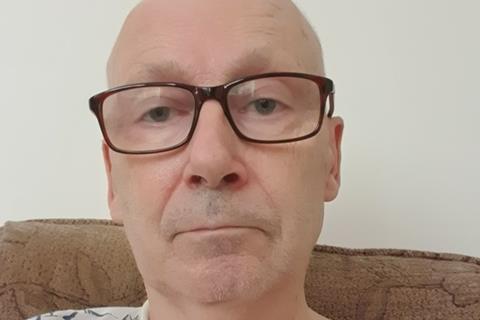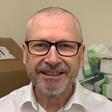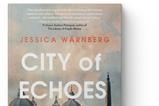Serious illness has brought my wife and I closer to one another, and closer to God, says Alan Palmer, as he lists 16 spiritual lessons he's learned in the midst of crippling treatment for blood cancer

We just didn’t see it coming. Most people didn't.
In 2019 I was completely unaware that Covid-19 was rearing its ugly head, and that millions of precious lives would be lost worldwide.
As a chaplain working at James Paget University Hospital in Great Yarmouth, I began to have first hand experience of patients losing their lives. Many of my colleagues went down with the disease too. By the middle of 2020, it appeared that we were losing the battle.
With the delivery of vaccines came a ray of hope. Gradually hospitalisations and deaths decreased. There appeared to be some respite...and then came a surprising change of direction for me.
Guidance
In July 2021 I was appointed President of a Bible College in Edmonton, Alberta.
I was preparing to move to a Canadian classroom, without realising God was about to induct me into his own school.
It began when my wife Val started to act out of character, saying and doing strange things. Then one morning she woke with a very high temperature and was unable to speak. It was truly a frightening thing for both of us. Even though I work in a hospital, I felt the upsurge of panic in my gut. Val was admitted by ambulance to the same hospital where I work. My friend and colleague stayed after his shift to attend to Val.
After two weeks of various tests, Val was transferred to a specialist mental hospital where she was treated for acute psychosis and anxiety. She was hospitalised for five weeks and with counselling and appropriate medication showed enough progress to be discharged home.
At first we postponed the planned move to Canada. But it soon became apparent that Val wouldn't be able to cope with the change, so I withdrew from the role.
Practically and from a family perspective, not going was a 'no-brainer'. But I couldn't help but wonder what God was up to. We had felt called to that role. Did we get it wrong?
Leaning in to God’s love
In this uncertainty and disappointment, we began to learn a basic lesson: How to trust God whatever is happening. That he knows what he is doing, even when it is all fog to us. That God is a good Father who has good plans for us (Jeremiah 28:11, Matthew 7:11, Romans 8:28).
We learned that whatever God is doing in our lives, its origins lay in his immeasurably huge loving heart (Ephesians 3:18-19). We reminded ourselves that God doesn’t suffer from amnesia. He never forgets about us (Isaiah 49:14-16).
We were in a bit of a pit, but we were counting on God to come through for us (Psalm 130:5). Perhaps reflecting on this psalm, Corrie Ten Boom said, "There is no pit so deep that God’s love is not deeper still.” We have found this to be true.
Multiple Myeloma
By October 2021, we thought we had scrambled out of the pit. Val was getting better. I was returning to the job I love. Perhaps we had learned the lessons God wanted us to learn? Time for graduation from God’s classroom!
It wasn't to be.
I discovered I had Multiple Myeloma, a blood cancer. Treatable, but not curable.
I was stunned.
I immediately stopped work and began a gruelling six month regime of chemotherapy, which left me with impaired sensation in both my fingers and feet. I had a stem cell transplant in July 2022, which required three weeks of isolation in hospital. The additional high dosage of chemo made me severely nauseated, as well as other really nasty side effects: mouth ulcers, diarrhea, rapid lose of appetite and weight. I lost all my bodily hair. I felt and looked awful.
As if the physical distress wasn’t enough, I had a number of psychological demons to wrestle down. I was very anxious, even panic stricken at times. I was depressed by the treatment and the lonely hours spent in isolation. I struggled with dark thoughts. I knew that Multiple Myeloma does return at some point. What if I have to go through all this treatment again? What if the doctors couldn’t keep the disease in deep remission? These despondent thoughts were difficult to keep at bay.
I felt abjectly guilty too. Val was 25 miles away, having to deal with her 92 year-old father being very unwell - on top of everything else - and I was stuck in hospital, unable to be there for her.
After 19 days of treatment and isolation, I was discharged from the hospital. This was for a period of three months recuperation before the maintenance stage of my treatment began.
You would think I would be overjoyed at the prospect of going home. Quite the opposite, I was scared to be at home without immediate medical care to hand. Val was equally nervous about it too.
As anyone who has experienced a life threatening illness will know, you become super aware of every bodily sensation. Every, twinge, ache or pain spikes your anxiety. I also found the prospect of taking my smorgasbord of daily meds quite depressing. I had to force myself to do this.
I have never experienced the level of fatigue that I had during this period. I would get up at 11am, and almost immediately fall asleep on the couch. It took a super human effort to walk to the bathroom and back. It felt like my 'get up and go' had got up and gone. Perhaps forever.
I love food. But I had no sense of taste. The chemo had severely impacted my taste buds. I had to force food down. Everything tasted like cardboard. My beloved morning cup of coffee tasted no better than insipidly flavoured hot water.
Even when I became a little stronger, I was afraid to leave the flat because of the danger of infection. The chemo had wiped out all my vacinations. I would have to repeat all my Covid jabs. The flat felt like the only truly safe place.
Slowly my strength started to return, the tiredness lessened, my taste buds reactivated, sensitivity in my hands and feet began to return, and my hair grew back.
As I write this I’m scheduled to return to work at the hospital. This will be part time and working remotely in order to keep safe from infections. It’s been nearly a year since we entered God’s Classroom. What have we learned so far?
Lessons from God’s classroom
1. Be candid, honest and reflective about your experiences. There is a place for speaking about "faith in a wintry season", as the Catholic Theologian Karl Rahner put it. Christianity is not all sunshine and blue skies, we know this, and we need to speak more honestly about it.
2. There are times where our path goes through ‘shadowy’ terrain (Psalm 23:4). There are ‘dark nights of the Soul’, as St John of the Cross put it. At times Satan unleashes his "fiery darts" of doubt and despair on us (Ephesians 6:26). Into our minds can creep uncharitable things about God. Is God’s love real? Is his power sufficient? Is he really there for us? What we have learned in this context is, where there is darkness, God walks through it with us (Psalm 23:4). And when the destructive arrows of doubt are released, we are to shelter behind God as our shield and protector (Genesis 15:1 and Ephesians 6:16).
3. We have to literally run, ‘into God’, as he acts as a ‘strong tower’ (Proverbs 18:10). God walks with us through the dark times, the firey times and those situations threatening to overwhelm us (Isaiah 43:1-3, Daniel 3:25).
4. There is absolutely no shame in tears. We cried them by the bucket load. Tears are not a sign of weakness, but a mechanism of release and relief. Moreover, God finds the tears of his people to be precious and wants to record and keep them safe (Psalm 56:8-11).
5. We have learned to commit the day to the Lord as we wake up. Then to lean into his love to get us through the day. Like most people who are going through serious illness, the mornings are often very difficult. The habit of giving the day to God before doing anything else has been important for us.
6. The whole family is impacted by one person’s serious illness. Sometimes we forget that fact. It’s important to show wrap around care for the whole family.
7. The myth of control. The idea humans are in total control of their lives is a myth. W.E Henley’s poem ‘Invictus’ is incorrect. We are not "Masters of our own fate", neither are we "captains of our ship". Nor are we simply the pawns of impersonal fate or subject to what Shakespeare called, "the slings and arrows of outrageous fortune". Put simply, our lives and our times are in the hands of God (Psalm 31:15).
8. God is still on the throne, in control and taking charge. In the maelstrom of the last year, when the foundations of our lives seemed to be shaken, we have learned to depend on the Psalmist’s words, "The Lord still rules in heaven" (Psalm 11:4).
9. God had a plan, one that we could only see respectively. We now realise that God stopped me from going to Canada for my own good. If I had gone, as a typical male, I may well have ignored the symptoms of Myeloma. God knows best when to shut doors.
10. Every day is a gift and a chance to deepen special relationships. God gives us the gift of time. We have learned to appreciate that and use it to know him better. Prayer and his Word are more embedded in our daily lives. Val and I have grown much closer through this experience. This is also true in terms of my relationship with my sons. We have experienced what Paul described as, "the love of God being shed abroad in our hearts by his Holy Spirit" (Romans 5:5). Our love for each other has deepened through suffering.
11. Don’t be afraid. We discovered that when Jesus says, "Don’t be afraid, I am here", that we really can trust his calming presence. Jesus is great at quietening both our internal and external storms (Matthew 14:22-32).
12. The discipline of helplessness. We are learning that without Jesus we can do nothing (John 15:5). Feeling week and inadequate to face the realities of life, are a fundamental part of the Christian’s experience (2 Corinthians 12:10). We are utterly dependent on God.
13. The discipline of stillness. I have begun to learn a lesson that is difficult for my personality type. I have a tendency to be driven, hyperactive and to overwork. Myeloma has pulled the handbrake up on this. I have tried to implement Dallas Willard’s words and "ruthlessly eliminate hurry". I am trying to "wait on the Lord" (Psalm 27:7). Trusting in the God who is never too early, never too late, always on time.
14. Rest and refreshment. As an activistic and extroverted person, staying still and resting do not come easy. In the past, holidays and rest seemed to me a waste of time. But with Myeloma you have to take longer periods of rest. In learning how to be still, to be quiet and rest in God’s presence, I have acquired a better ability to hear his voice. Like Elijah I have learned that God is more likely to whisper rather than shout. We need to be still and quiet to hear his voice and recieve his strength (1 Kings 19:12 "a gentle whisper").
15. Health and Healing. Val and I have learned to trust God for our health and healing. We absolutely believe that God still heals people today. Sometimes he uses the skills of medical staff. At other times he miraculously heals through faithful prayers (James 5:14-15). But if he chooses not to heal in the way we would like, we will still trust in him (Daniel 3:16-18).
16. God opens some doors and closes others. He always knows what’s best for us, even if we can’t see it at the time. We have learned to trust him more during our extended time in God’s Classroom. Jesus said, "I have told you all this so that trusting me, you will be unshakeable and assured, deeply at peace. In this godless world you will continue to experience difficulties. But take heart! I have conquered the world." (John 16:33).




































No comments yet